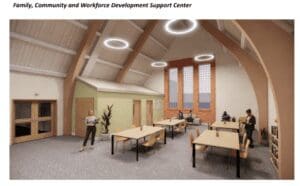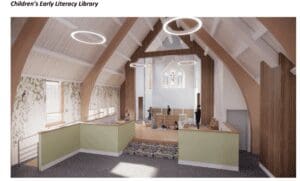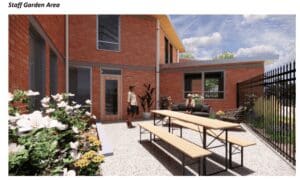A $1 million federal allocation puts a Wilmington nursery and early childhood education center serving vulnerable families on the doorstep of its $6.5 million in capital projects.
St. Michael’s School & Nursery now has $5.5 million raised for its construction needs, which the school started on about a year and a half ago in late 2022.
The most recent funding source came last week, a $1 million allocation through Community Project Funding, which are federal grants that invest in many unique projects like housing, homelessness prevention, workforce training, public facilities, parks, resilience planning and other critical infrastructure and service.
“We are in construction and have been for over a year, we’re almost done and in June, we will have the first phase of our construction done,” said Lucinda Ross, executive director at St. Michael’s, “and that’s the point of which we will have two new
classrooms, we will have six classrooms totally renovated on one half of the building, and then they’ll start on the other half of the building.”
The school has not closed during the ongoing construction, largely due to the demographics that it serves.
“80% of our families come from subsidized households,” Ross said, “and they struggle day to day, so we did stay open.”
At the beginning of the projects, the school was serving 100 students. After the construction is done – which Ross hopes will be by this October – St. Michael’s will be able to serve about 185 students.
Lack of child care options
In February, 2023, Rodel – an educational advocacy group that aims to strengthen the state education system and workforce through partnerships and sustainable solutions – published a report that indicated Delaware families do not have adequate access to affordable child care.
RELATED: Child care report: First State lacks affordable options
In a survey with hundreds of Delaware families aimed at gauging their feelings about child care services, Rodel found that caregivers of children five years and younger shared common complaints about long waitlists, high prices and a lack of options around them.
The problem is even worse in Kent and Sussex counties.
Child care affordability and access has been an ongoing problem, so much so that Gov. John Carney made changes earlier this year, such as capping co-pays for families at 7% of family income, removing all co-pays for families below 150% of federal poverty level and increasing compensated absence days from five days to 10.
“It means a lot,” Ross said. “I’m happy to see that there will be more slots open because we have probably around 50 children total on the waitlist, so the need is there.”
Ross applauded Carney’s administration and said she’s thankful it is fighting a battle that isn’t always a popular one with investing into early education and childhood care.
Carney’s administration has more than doubled investments in Purchase of Care and the Early Childhood Assistance Program (ECAP), to $83 million in Purchase of Care and $15.7 million in ECAP for the fiscal year 2025 budget.
Both programs either reimburse or discount child care costs based on a family’s income level.
“Our self-pay families pay the same rate as the Purchase of Care rates in Delaware,” Ross pointed out. “$1,406 a month for infants, $1,222 a month for toddlers and $1,062 a month for preschool.”
Ross said many families also receive help through Head Start, a federally-funded program promoting school-readiness in children from birth to age five.
Eligibility is based on income, and the program provides resources and supports to enhance cognitive, social and emotional development. It also is built on the foundation that parents are their child’s first and most important teachers.
St. Mark’s has also added infant and toddler rooms to its building, located at 700 North Walnut Street in Wilmington. The capital project also includes new HVAC systems, implementing energy efficient windows and doors, new floors and more.
Besides the most recent $1 million, Ross said more than a dozen entities made notable donations to the $6.5 million capital campaign.
“Investments in early care and education are critical to expanding access for Delaware’s families and making child care affordable,” said Madeleine Bayard, senior vice president at Rodel and chair of the Delaware Early Childhood Council.
This federal funding for St. Michael’s School and Nursery, Bayard said, will support new classrooms to serve more children in high-quality learning environments.
St. Michael’s is 134 years old.
“It started out, kind of gathering children from the riverbanks where their parents went to work in the tanneries in Wilmington, “Ross said, “and it’s gone through all sorts of iterations, it’s really fascinating.”
Interestingly enough, Ross said this is actually the second pandemic the school has been through, as it took care of families during the pandemic of 1918.
“It was once known as the Hospital for Colored Babies because it was the only place in the city where families of color could get medical care,” she said.
Ross joked that she knows more about sewer pumps than she ever really wanted to, and admitted it was a large learning curve in the sense of building maintenance.
“But it just became obvious that we needed to do something about it,” she said, which is what led to the capital campaign.
Programs like St. Michael’s that serve primarily low-income families need significant support, Bayard said, including increased, ongoing investments from the state and federal governments.
“With only one in seven children under age five served today in public programs, and most parents indicating that the cost of child care is holding their family back,” Bayard said, “greater ongoing funding will help expand access and affordability, support Delaware’s economy, and give children a strong start.”


Raised in Doylestown, Pennsylvania, Jarek earned a B.A. in journalism and a B.A. in political science from Temple University in 2021. After running CNN’s Michael Smerconish’s YouTube channel, Jarek became a reporter for the Bucks County Herald before joining Delaware LIVE News.
Jarek can be reached by email at [email protected] or by phone at (215) 450-9982. Follow him on Twitter @jarekrutz and on LinkedIn
Share this Post





















